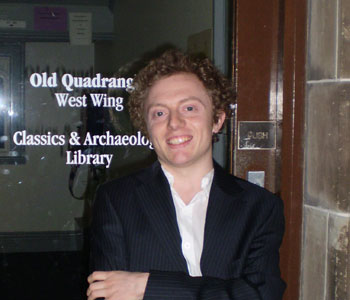Calvert, John
Sayyid Qutb and the Origins of Radical Islamism
Columbia/Hurst
256 pages, 8 1/2 x 5 1/2 inches
ISBN 978 0231701044
My book is a biography of Sayyid Qutb (1906-1966), the influential Egyptian ideologue of Islamic revolution.
No other Islamist thinker, with the possible exception of the South Asian Abu l-A‘la Mawdudi (1903-1979), exerted a comparable influence on Islamic activism, both in his own day and in the generations that followed.
My book traces the development of Qutb’s worldview from his village childhood up to his execution at the hands of Egypt’s ‘Abd al-Nasser regime. I pay attention to the gamut of influences—cultural, political, social and economic—that shaped his thoughts on the proper role of Islam in the state and society, and in the end propelled him in the direction of radicalism. The book attempts to understand the evolution of Qutb’s ideology in the myriad details of his life. It is a study of an individual and of his times; of objective circumstance and subjective experience, and of how each influenced the other.
But the book also has a critical purpose.
In the wake of the 9/11 terrorist attacks, many scholars and journalists looked to Sayyid Qutb as a progenitor of Bin Laden’s and Ayman al-Zawahiri’s global jihad. Such an equation is not entirely correct.
Although, like al-Qaeda, Qutb preached a total, uncompromising struggle of Islam against its conceptual opposite, Western secular civilization, he was not an advocate of indiscriminate violence.
Qutb would have condemned the violent actions perpetrated by the Egyptian jihadis of the 1970s and 1980s and by al-Qaeda and its regional affiliates today. He would not have understood al-Qaeda’s desire to attack a Western power, such as the United States. In Qutb’s mind, the jihad targeting “iniquitous” Muslim regimes was always paramount.
Ultimately, I want readers to understand objectively how and why this important Islamist thinker repackaged the rich resources of the Islamic heritage for purposes linked to social and political transformation. I aim to provide readers with a highly contextualized study that will allow them better to comprehend contemporary Islamist movements.

Qutb would have condemned the violent actions perpetrated by the Egyptian jihadis of the 1970s and 1980s and by al-Qaeda and its regional affiliates today. He would not have understood al-Qaeda’s desire to attack a Western power, such as the United States. In Qutb’s mind, the <em id="">jihad</em> targeting “iniquitous” Muslim regimes was always paramount.
All too often scholars understand Islamism as a channel for material discontent, or else in terms of rational choice theory, which holds that most, if not all, forms of human activity are goal-oriented and organized around sets of hierarchically ordered preferences.
There is a great deal of merit in these functionalist approaches and my study draws upon some of them for explanatory effect. Yet, I also contend that we cannot properly understand Qutb unless we look into his religious imagination and take seriously his ethical and moral concerns.
I make the point that Qutb’s primary contribution was his ability to harness this deeply felt spirituality for purposes of worldly transformation. In this sense, he sought to restore a sense of religious meaning to an immoral and disenchanted colonial world.
But I also tap his emotional state, especially his simmering discontent, which often spilled over into anger.
Some of his irritation was a product of his personality—namely, his sense of intellectual superiority and inability to suffer fools gladly. But objective factors also spurred his annoyance—economic injustice, political corruption, cultural degradation and domination by foreigners.
In paying heed to the affecting aspect of Qutb’s discourse, I recognize the contributions of social historians and anthropologists who have emphasized the importance of emotional perception as a factor in history.
I therefore adopt a degree of empathy toward Sayyid Qutb and his work.
To be sure, there is much in his thought that many people, including myself, find disagreeable.
Qutb spoke of cultures as monolithic and static—a hard “us” vs. “them” vision of the world that encouraged the worst kind of stereotyping. Qutb had harsh things to say about Westerners, Judaism and Zionism (which he conflated), and especially Muslims who cooperated with Western powers and adopted the secular view. Yet, opening up to Qutb’s universe of thought and emotion allows us to understand the textures, feelings and imaginings that contributed to the production of his Islamism.
My first “encounter” with Sayyid Qutb occurred, appropriately enough, in Egypt where I studied Arabic at the American University in Cairo in the late 1980s.
I had arrived in Cairo as an aspiring medievalist, intent on investigating the history and culture of the Mamluks. Soon enough, however, the pulse of contemporary history took hold of me, nudging the medieval dynasties to the periphery of my academic interest.
In those days, seven years after the Jihad Group assassinated Egyptian President Anwar Sadat, militant Islamist organizations were again on the prowl, and Sayyid Qutb’s name was in the air. I thought that here was somebody worth studying—a man who drew upon the hallowed corpus of the Islamic heritage in order to craft a vision of life and governance ostensibly different from that currently in place. However, other commitments prevented me from approaching the topic of Qutb head on until years later.
I was also fascinated, and unnerved, by Qutb’s ideological certainty. Qutb held a conviction that there is an objective truth in the universe, holding answers to all of life’s quandaries, which people are obliged to realize in the here and now, forcefully if necessary.
As someone possessed of a liberal and questioning attitude, at least on most matters, I was interested in discerning the circumstances and motivations that might lead a person, such as Qutb, to struggle and sacrifice at the altar of an abstract, encompassing idea.
Certainly, Qutb was not alone in espousing ideological certainty. From the nineteenth century to our own time, numerous leaders and followers—adherents of Anarchism, Communism, Nationalism, and Imperialism—have laid claim to truth in attempts to realize utopian dreams or manifest destinies, usually with negative consequences.
In the 1950s, as the Cold War unfurled, Eric Hoffer famously referred to such people as “true believers”—individuals who “plunge headlong into an undertaking of vast change.”
Qutb was not quite the fanatic that Hoffer had in mind. His morality propelled, but also softened his ardor, to the extent that many Muslims who are in no way attracted to radical causes—in other words, the vast majority of Muslims in the world—will read aspects of his works for benefit.
Yet there is no denying the fact that Qutb, gripped by the divine design of the universe, was driven by the belief that he was defending God’s absolute truth against the apparent barbarism of the modern world.
I wanted to know how, why, and to what effect, Qutb transformed the faith that he had inherited from his father into a radical ideology.
In 1954, Egypt’s new revolutionary regime arrested Sayyid Qutb and hundreds of other Egyptian Islamist following a Muslim Brother’s assassination attempt on President Nasser. Qutb had joined the Muslim Brotherhood, Egypt’s largest Islamist movement, the previous year. One of the most important sections of the book deals with how Qutb’s subsequent imprisonment and torture affected the evolution of his ideas.
During the last years of the monarchy, Qutb attempted to mobilize the Egyptian people in the direction of change within the legal framework of the state. But now, languishing in Tura prison, he understood that advocacy politics were ineffective against a regime that was prepared to eradicate, without compunction, its Islamist and other critics.
As a result, Qutb shifted his emphasis from Islam’s equation with social justice to the fundamental issue of political legitimacy. Accordingly, his demand for an “Islamic order” became emphatic with strong appeals to core doctrines and principles.
In Qutb’s refurbished view, however much Nasser claimed to represent the interests of Egyptians and other Muslim peoples, Nasser’s refusal to implement Islamic law (the Shari‘a) qualified him as usurper of God’s sovereignty, which all the peoples of the world ought to follow.
In fact, said Qutb, so great was the level of cultural, political and economic oppression in Egypt and elsewhere, that only a circle of adepts, a vanguard, could awaken the masses and mobilize them in the direction of change.
In coming to this tactic, Qutb had in mind the model of the Prophet Muhammad and the first Muslims who, from an initial position of weakness, had gradually built up their power so that they could confront head on the oppressors.
But the book also makes clear that Qutb was inspired, at least unconsciously, by modern currents of rebellion and political change. That is to say, Qutb imbibed and repackaged in Islamic form the Jacobin characteristics of the European revolutionary tradition.
Interestingly, Qutb underscored the purported illegitimacy of the Egyptian Republic, and by extension all other non-Islamic regimes and societies, by equating its moral universe with the condition of jahiliyya, “ignorance” of the divine mandate. As in the pre-Islamic era, “ignorance” of God enveloped the contemporary world. As a result, the strong oppressed the weak and materialism and individualism were rampant.
Qutb was especially concerned with decadent and immoral behavior, especially of the sexual variety. Muslims may believe in God and his prophet, pray, fast, perform the Hajj, and dispense charity. But as long as their lives “are not based on submission to God alone,” they are steeped in jahiliyya and cannot be reckoned fully as Muslims—a controversial supposition that went against the grain of Islamic theology, which historically advocated inclusiveness and tolerance.
Qutb’s radical ideology confirms the contention that the totalistic quality of revolutionary movements owes much to the authoritarian nature of the regimes against which they operate.
Such had been the case, for example, in nineteenth-century Russia where nihilist and anarchist groups converged on the complete triumph of their idea against the tyranny of the czarist system. It was also true of the savage insurgencies in Egypt and Algeria in the 1990s, which pitted radicalized Islamists against the state. In each case, repressive bureaucratic-authoritarian regimes encouraged the maximal intentions of various jihadi groups.
Seen in this light, Qutb’s gravitation to ideological totality anticipated, and in part inspired, the “friend-enemy” distinctions that drove the Islamist-state conflicts of the late twentieth century.

Qutb underscored the purported illegitimacy of the Egyptian Republic, and by extension all other non-Islamic regimes and societies, by equating its moral universe with the condition of <em id="">jahiliyya</em>, “ignorance” of the divine mandate. As in the pre-Islamic era, “ignorance” of God enveloped the contemporary world.
One cannot deny Qutb’s contribution to the contemporary tide of global jihad.
His practice of sharply distinguishing between those who uphold a true and authentic understanding of Islam and “iniquitous others,” no less than his view of jihad as the obligatory means to eliminate disobedience to God, anticipate aspects of al Qaeda’s discourse.
Yet, if the al-Qaeda threat enhanced Qutb’s public profile, it has also monopolized and distorted our understanding of his real contribution to contemporary Islamism.
In the search for al-Qaeda origins, even well intentioned observers tend to focus on points of similarity between Qutb’s thought and that of Al Qaeda. But they ignore significant anomalies.
And if some students of the jihad are careful to situate Qutb correctly in relation to al-Qaeda, still they often consign him to the position of opening act. Rarely do observers of the Islamist scene address Qutb’s singularity.
Herein lies a lesson. In resorting to short cuts, we pass over a history that is as nuanced as any other. We run the danger of succumbing to a “neo-Orientalist” style that subordinates particulars to an essential and enduring identity, and that ignores complexity in favor of simplicity.
It is this kind of essentialist thinking that has led some to posit a “clash of civilizations,” or to consider all Islamist movements as identical in terms of aims, strategies and tactics. There is a great deal of ideological and organizational difference, for example, between the Muslim Brotherhood and the groups inspired by al-Qaeda.
Researchers need to study Islamist thinkers and movements on their own terms, with reference to their distinctive environment and concerns. Only by regarding Islamist discourses as flexible and historically contingent will we, as outsiders to the phenomenon, comprehend the various challenges put forward by Islamists in the contemporary period.
For this reason, I chose in the book to situate Sayyid Qutb firmly in his Egyptian environment, examining the evolution of his ideas with reference to the tumultuous events of the time.




We don't put paywalls. We don't distract you with ads. We don't sell your data.
Please help to keep this running!